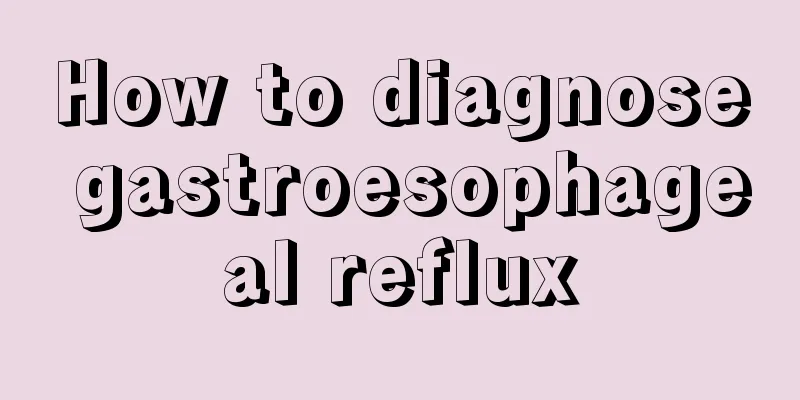Constipation after diarrhea

|
Many people will experience constipation after experiencing diarrhea, which will make them feel very uncomfortable and affect their physical condition. Therefore, if you feel constipated, you must go to the hospital to find out the cause of the disease so that targeted treatment can be taken to improve the condition. Some patients suffer from constipation due to eating habits. (I) Functional constipation 1. Eating less or the food lacks fiber or water, which reduces the stimulation to colon movement. 2. Normal bowel habits are disrupted due to work stress, fast pace of life, changes in work nature and time, and mental factors. 3. Colonic motility disorder: common in irritable bowel syndrome, caused by spasm of the colon and sigmoid colon. Some patients may experience alternating constipation and diarrhea. 4. Insufficient tension in the abdominal and pelvic muscles leads to insufficient force for defecation, making it difficult to expel feces from the body. 5. Abuse of laxatives leads to drug dependence, causing constipation; the elderly are weak, lack of activity, intestinal spasms leading to difficulty in defecation; the colon is long. (ii) Organic constipation 1. Rectal and anal lesions cause anal sphincter spasm and defecation pain, resulting in fear of defecation, such as hemorrhoids, anal fissures, perianal abscesses and ulcers, proctitis, etc. 2. Local lesions lead to weak defecation: such as large amounts of ascites, diaphragm paralysis, systemic sclerosis, muscular dystrophy, etc. 3. Complete or incomplete colon obstruction: benign or malignant colon tumors, Crohn's disease, and congenital megacolon. Intestinal adhesion, intestinal torsion, intussusception, etc. caused by various reasons. 4. Compression by tumors in the abdominal or pelvic cavity (such as uterine fibroids). 5. Systemic diseases cause intestinal muscle relaxation and weak defecation, such as uremia, diabetes, hypothyroidism, cerebrovascular accident, paraplegia, multiple sclerosis, dermatomyositis, etc. In addition, porphyria and lead poisoning can cause intestinal muscle spasms and lead to constipation. 6. The use of morphine-like drugs, anticholine drugs, calcium channel blockers, nerve blockers, sedatives, antidepressants, and antacids containing calcium and aluminum can relax intestinal muscles and cause constipation. [1] Hemorrhoids, anal fissures, perianal abscesses, ulcers, proctitis, massive ascites, diaphragmatic paralysis, systemic sclerosis, muscular dystrophy, benign and malignant colon tumors, Crohn's disease, congenital megacolon, intestinal adhesions, intestinal torsion, intussusception, uremia, diabetes, hypothyroidism, cerebrovascular accident, paraplegia, multiple sclerosis, and dermatomyositis. |
<<: What to use to ripen bananas
>>: Why do bananas help with bowel movements
Recommend
Will infection with Helicobacter pylori definitely lead to stomach cancer?
Being infected with Helicobacter pylori does not ...
The dangers of severe primary pulmonary hypertension
Primary pulmonary arterial hypertension poses a g...
What are the symptoms of talar necrosis?
Talus necrosis is a common disease, mainly caused...
How to treat advanced pancreatic cancer
The patient, a 65-year-old male, was in the advan...
Polycystic ovary syndrome diet
The ovaries are an important organ in the female ...
Which diseases are easily confused with colon cancer
What diseases are easily confused with colorectal...
Can electronic laryngoscope detect laryngeal cancer?
Electronic laryngoscopy may reveal laryngeal canc...
What are the symptoms of early lung cancer? A brief analysis of the three symptoms of early lung cancer
Lung cancer is a relatively serious malignant tum...
Can I eat durian when I have a cough? Why?
Generally speaking, if you have symptoms of cough...
How to identify ocular flat warts
In real life, people may misidentify diseases due...
How much does endometrial cancer screening cost
The uterus is a very fragile organ in our human b...
Osteosarcoma diagnostic reference standard
According to a survey, about 20% of osteosarcoma ...
How to absorb joint cavity effusion quickly
Joint effusion is a very common health problem. I...
What to do if the skin turns yellow due to liver disease
Liver disease is a disease that occurs in the liv...
What are the signs of cerebral hemorrhage
Cerebral vascular hemorrhage is what we usually h...









